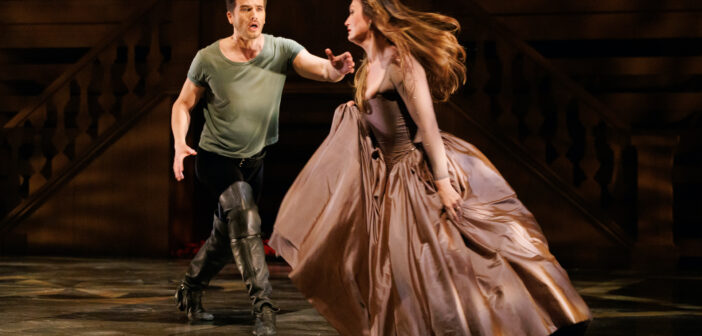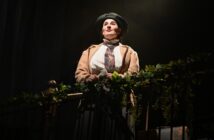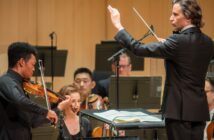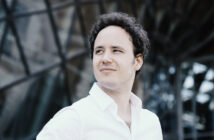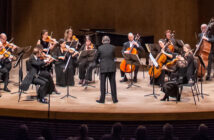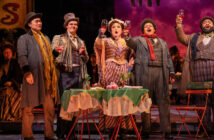All is Love, which Opera Atelier opened on April 11 at Toronto’s Koerner Hall, is a heady pastiche of art song, opera and dance. It offers styles ranging from formal Baroque opera seria to hothouse belle époque French mélodies right through newly-composed and choreographed music and dance. Throw in a lot of the Baroque dance choreography for which the company is famous, and the result is a heterogeneous mix of numbers that often impress individually but fail to add up to a dramatically satisfying whole.
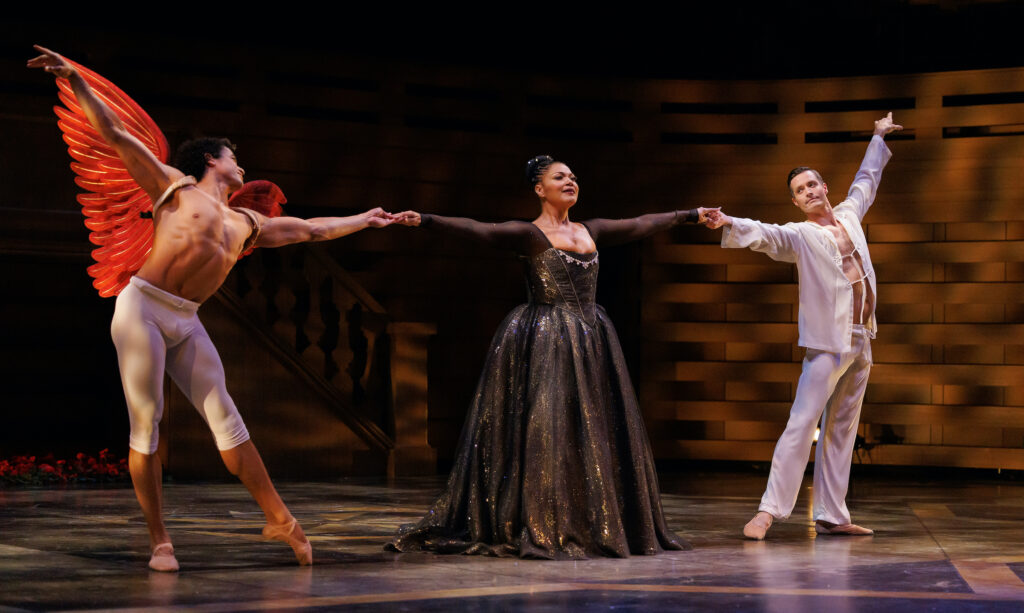
L-R: Eric Da Silva (Amour), Measha Brueggergosman-Lee & Tyler Gledhill (Morpheus) in Opera Atelier’s All is Love. Photo: Bruce Zinger
Take the opening sequence featuring soprano Measha Brueggergosman-Lee, a mash-up of Henry Purcell’s gorgeous 1695 bravura song “Sweeter than Roses” and Reynaldo Hahn’s 1916 neoclassical masterpiece “À Chloris”. Just as Brueggergosman-Lee should have launched into the agitated “Shot like fire” section carefully crafted by Purcell to contrast with his song’s dreamy opening statement, the momentum was sapped by an abrupt transition into Hahn’s stately rhythm.
This penchant for languor dominated the majority of the program’s musical choices. Stunning lyrical Baroque chestnuts such as “Where’er you walk” from Handel’s Semele or another of Hahn’s cherished songs, “L’heure exquise,” are of course among the most ravishing gems of the vocal repertoire. There was too much sleepiness, however, often augmented by singers and dancers droopily lying down on the stage floor.
The relative lack of propulsive drama elsewhere in the program was brought to the forefront by the inclusion of the opening scene of Claude Debussy’s 1902 opera, Pélleas et Mélisande. Here, soprano Meghan Lindsay and bass-baritone Douglas Williams showed how compelling Opera Atelier can be, when the company presents fully fleshed-out characters, and dramatic declamation of text.
Co-Artistic Director Marshall Pynkoski drew utterly compelling performances out of these stellar artists that made the rest of the evening look pallid in comparison. Lindsay’s command of her ample instrument, unafraid to access her dramatic chest register and Williams’ nuanced, noble bearing and superb French made one long for a complete Opera Atelier production of Debussy’s symbolist masterpiece, rumored to be in the company’s future.

Danielle MacMillan & Edward Tracz in Opera Atelier’s All is Love. Photo: Bruce Zinger
The other vocal, and dramatic, highlight of the evening was mezzo-soprano Danielle MacMillan’s haunting rendition of “Mi lusingha il dolce affetto” from Handel’s Alcina. Here, standardized Baroque gestures were infused with deep emotion. MacMillan unfurled gorgeous warm-toned vocal lines which she embellished with expressive coloratura and perfectly-calibrated diminuendi.
Baritone Jesse Blumberg sang a tender, comforting “L’heure exquise” to his saddened lover, tenor Colin Ainsworth. The latter had a few difficulties with the high-lying tessitura of Jean-Baptiste Lully’s “Plus j’observe ces lieux,” but rallied for a sunny rendition of his Semele aria. Soprano Cynthia Akemi Smithers was delightful in “O sleep, why dost thou leave me” from the same opera, albeit once again in the evening’s dominant somnambulist vein. Brueggergosman-Lee offered some of the rich, burnished tone which launched her career over two decades ago.
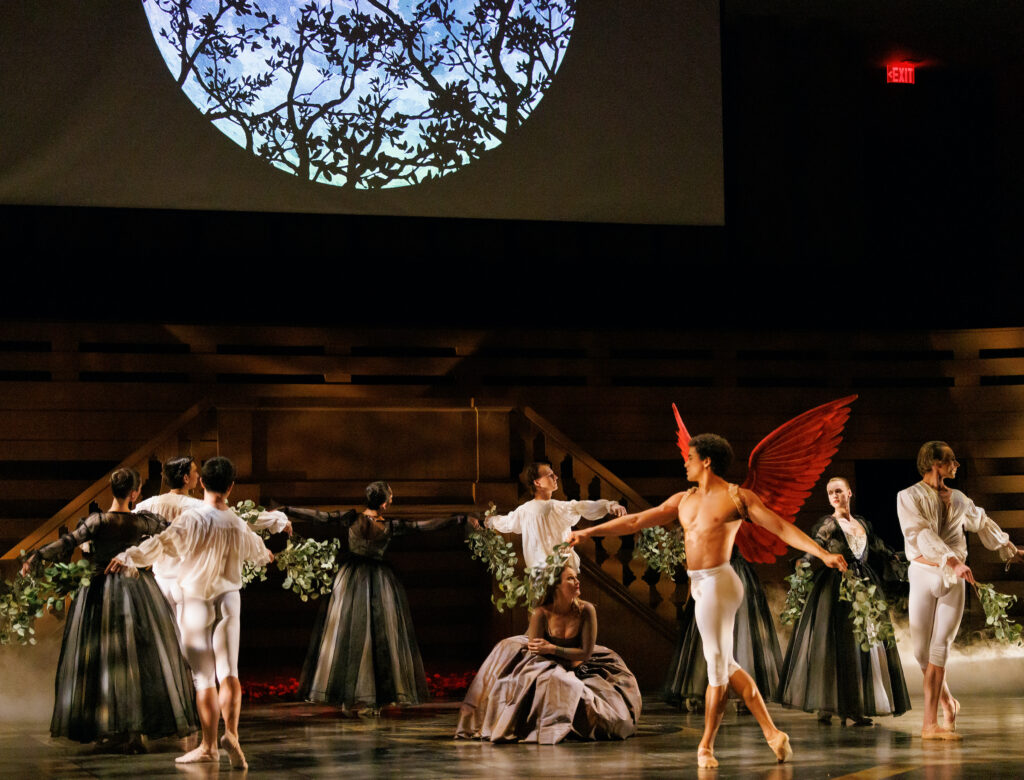
Opera Atelier, All is Love. Photo: Bruce Zinger
Visually, this was a rather understated affair in the context of the company’s typical elaborate aesthetic. Koerner’s cool, blonde wood stage was simply adorned with a double staircase above which a large screen projected decorative images and surtitle translations. The illustrations by frequent Opera Atelier collaborator Gerard Gauci were perfectly attuned to the various musical styles and periods of the program.
The artists of Atelier Ballet executed their understated, period-appropriate choreography with their customary skill and beauty. Featured dancer Eric César de Mello da Silva, decked out in red Cupid wings, was granted a few grand jetées in a nod to choreographic styles more associated with the 19th-century elements of the program.
Though not equipped with ample offstage wing space nor a proscenium frame, the hall’s superb acoustic proved advantageous in comparison with the dry sound at the Elgin Theatre, the company’s more customary venue. The Tafelmusik Baroque Orchestra, under conductor David Fallis, has never sounded so beautifully resonant, as did the singers, in this justifiably world-famous hall. Next season, Opera Atelier will present Charpentier’s David and Jonathan at Koerner Hall, a welcome return to fully-staged opera for its 40th anniversary.

